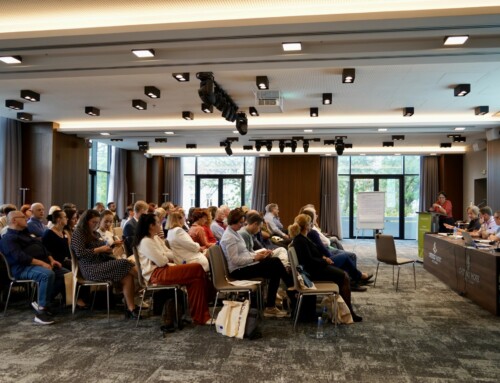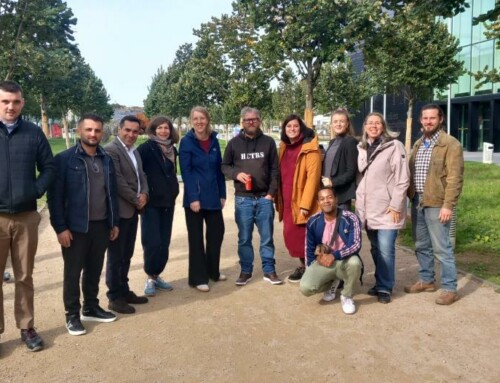Some personal reflections from one of our i2connect partners Tom Kelly, TEAGASC on 13 topical insights that relate mainly to Advisory Activities in supporting interactive innovation. Farm advisors and farmers become very effective and screening they will look for relevance of your message and ask so what? in Kerry in the South west of Ireland they ask – why so?.
| Topical Insights | Why I think these are relevant? |
| Face to face review meetings | Face to face is better to understand the innovation story |
| Advice on farm succession | Important to be involved in big farm family decisions |
| Advisory focus shifts from farm to family advice | The challenge of support for farm family as well as farm innovation |
| Trust and adoption | Trust building is important in the delivery of inov- supports |
| EIP & co-innovation | Many different approaches to support innovation |
| Overcoming the digital divide | Online activities in MAA may exclude the targeted |
| The power of vocational education and training in the AKIS | Value vocational training it is powerful |
| The new entrant journey. | Clarity and simlification needed to new entrant farmers |
| Filling the knowledge gaps for new farmers | New entrant farmers should be valued more |
| Partnerships | Innovation brookers may or may not be needed in partnerships |
| Innovation-led/ farmer-led projects | Farmers active vs farmers present in Ogs |
| The nature conservation advisory concept | Using a real dilemma to generate more action |
| Importance of co-designing | Recognising quality service and benchmarking success |
Value of face to face review meetings
Anita Naughton, Teagasc, Ireland
LIAISON WP3 partners conducted a ‘light touch review’ of 200 multi-actor interactive innovation cases in agriculture, forestry and rural development ranging from H2020 projects, Operational Groups to ‘under the radar’ networks. The cases varied in terms of geographical location, size number of partners, type of funding and length of operation. Project leaders who participated in the review rated excursions and field days, together with face-to-face meetings of diverse actors to discuss issues, as the best methods of communication, idea generation and innovation (Fieldsend et al., p. 53, 2019).: https://liaison2020.eu/wp-content/uploads/2020/05/LIAISON-Deliverable-3.2-Discussion-paper.pdf.
Advice on farm succession
Fanos Birke, UHOH, Germany
In Germany, the demand for farm succession advice is increasing as younger farm successors or interested siblings are asking for it, or start-ups are interested in taking over existing farms. To respond to the demand, advisors and advisory organizations in Germany are developing advisory topics and formats in farm succession besides the ‘classical’ agriculture advice. Advisory organizations such as chambers or public organizations collaborate with associations and third sector organizations to provide farm succession advice and facilitate professional support using multiple methods. The insight here is the diversification of services in agriculture advisory organizations and the focus on broader topics of advice that address the legal, economic, social and personal conditions. More about farm succession advice in Germany https://www.bildungsserveragrar.de/zeitschrift-bub-agrar/online-beitraege/online-spezial-archiv/beratung-bei-der-hofuebergabe/
Advisory focus shifts from farm to family advice
Fanos Birke, UHOH, Germany
The focus of agricultural family advisory service is on people in both their living and working environment. Through collaboration associations, church-based organizations, private sectors…, advisors work to strengthen the capacity and individual resourcefulness of their clients to improve their quality of life. Topics on family advisory include inheritance law, marriage contract, tax, and inter-personal difficulties such as fear, burnout and depression. Advisors who provide family advice are expected to know the context and the agriculture practice in the area and the subject matter. The insight from this topic is the increasing demand for new knowledge and skills for advisors to support in solving problems or addressing concerns of farm holdings in rural areas.
More on the topic: https://www.bildungsserveragrar.de/fileadmin/user_upload/Bilder/Literatur/BuBAgrar/Ausgaben/5003_2020_bub-agrar_x007.pdf
Trust and Adoption
Tom Kelly, Teagasc
In the H2020 IPM Decisions project the factors which supports the adoption and use of new digital decision support tools is the level of trust by farmers and advisors in the system. In looking the factors influencing adoption it found that there was a need for training, mobile access, combined text and graphics. The live demonstration of new DSS tools had a highly positive influence on trust and likelihood to adopt, while commercial advertising efforts had a negative influence on trust and adoption. In i2connect have we the correct approach to gain the trust of advisors, managers and farmers? Survey responses workshops | IPM Decisions
EIP & co-innovation
Lies Dubruyne, ILVO, Belgium
A recent paper published by partners of the LIAISON project, showed that the EIP-AGRI is just one part of a complex matrix of multi-actor co-innovation activities involving farmers and foresters in Europe. They state that it is important to recognise the existence of a multiplicity (projects, non-project activities, formal and informal) of multi-actor approaches. Their data suggests that many of these are effective methods of supporting co-innovation and are, therefore, ‘sharing the space’ within the AKIS. (https://www.tandfonline.com/doi/full/10.1080/1389224X.2021.1873156 )
Overcoming the digital divide
Lies Dubruyne, ILVO, Belgium
This is linked to the importance of digitalisation in advisory services. As mentioned, the current situation has led to a surge in digital approaches, also in farming and advisory contexts. It is however crucial to consider the existing digital divide, where the lack of infrastructure (e.g. broadband) is a real issue in many rural areas. As a result, Living Labs and other co-creation approaches, which also switch to online, may completely fail to include the more vulnerable end users, while their needs may in fact be the most pressing to consider in the current situation. This became clear during discussions about DESIRA Living Labs
The power of vocational education and training in the AKIS
Fanos Birke, UHOH, Germany
When we were compiling the AKIS report, we invited experts from various institutional affiliations to share their views on German AKIS. The experts discussed at length the diverse actors and complex linkages. One of the many fascinating insights from the discussion was the important role vocational schools and training institutions play in ensuring knowledge flows through their structures and strong linkage with diverse actors at multiple levels. Additionally, the continued need for enhancing advisory service quality, particularly by qualifying advisors with methodological skills was evident. This insight is relevant and interesting to i2connect in the sense that the project has much to offer to meet the demand of qualifying advisors by collaborating with existing structures.
The new entrant journey.
John Moriarty, Teagasc, Ireland
The reinforcement of good practice within the general succession and inheritance systems as a whole is weak and inconsistent in some European regions, with the importance of generation renewal and innovation potential offered by new entrant lost to traditional beliefs and practices. The Newbie project identifies the need for a clear and simple presentation of the new entrant journey to explain the education, legal, CAP, taxation and general policy steps and requirements along the way. They also need to be clear that the journey is an interactive innovation journey where support is available from advisors and other farmers. Newbie deliverable 2.3 Collection of strategic planning of advisory services identifies inconsistencies in the assistance available. While business planning is catered for in all regions, provision of advice on entry routes and dedicated advisors varies greatly. The full report can be viewed here; http://www.newbie-academy.eu/wp-content/uploads/2021/01/Deliverable-2.3_Collection-of-strategic-planning-of-advisory-services_Ma….pdf
Filling the knowledge gaps for new farmers
John Moriarty, Teagasc, Ireland
As new entrant farmers face a huge and steep learning curve, access to impartial advice and information is needed, not only for themselves but also their parents, other farmers and particularly farmers at the end of their working careers. The Newbie project is developing industry standard fact sheets aimed at individual farming contexts that will provide information on the agencies, institutions and businesses that are best placed to assist new entrants on a regional and national level. These factsheets will form part of the Newbie Umbrella Toolkit; http://www.newbie-academy.eu/umbrella-toolkit/ these should encourage collaborative approaches to farming and farm business decision making and involve all relevant actors in the AKIS support networks.
Partnerships
Alex Koutsouris, AUA, Greece
Partnerships between diverse actors are deemed necessary with regard to interactive innovation. Preconditions for partnership formation are a) positive attitude towards collaboration with others (vs. individualism) and b) knowledge of relevant others. On the other hand, if such preconditions are not in place, the existence of innovation brokers who can align demand and assist in network formation and management is essential. In this respect the training of advisors as facilitators/ brokers is essential.
Innovation-led/ farmer-led projects
Alex Koutsouris, AUA, Greece
The SCAR-AKIS SWG have stressed the need for and importance of transdisciplinary, innovation-driven research, that is of problem-based research through networks of stakeholders/ actors; in such networks the initiative and active involvement of farmers is a “sine qua non” precondition. EIP-AGRI, in-line with such thinking, has promoted Operational Groups (OGs) to strengthen interactive innovation in the EU. However, at first glance (at least), some among the OGs seem to violate such a rationale with farmers having rather a nominal role instead of a collegial relationship with other actors – especially researchers who either take the initiative and co-opt farmers in their projects or attempt to impose their agenda and solutions.
The nature conservation advisory concept
Fanos Birke, UHOH, Germany
In the state of Brandenburg, Germany, the existing publicly funded agri-environmental programs are hardly effective in advising farmers to the dilemma of high yield versus biodiversity. In addition, the privately organized agricultural advisory services do not focus on environmental issues. To solve this challenge, the project ‘Modellprojekt Naturschutzberatung Brandenburg’ started in 2020 aiming to support farmers in combining high yield farming with nature conservation measures. The project develops, tests and further improves nature conservation advisory approaches and associated organisational as well as financial structures specifically suitable for Brandenburg. To find out more on the “nature conservation advisory concept”, please go to https://www.naturschutzberatung-brandenburg.de/beratung/beratungsangebot/
Importance of co-designing together with the advisors practical tools for their systematic performance assessment
Simona Cristiano, CREA, Italy
In the RAMONES-PL project (Erasmus+; https://ramones.eu) a tool for performance assessment of advisory services was developed together with a group of advisors and based on the definition of quality criteria of services. The latter are based on the scientific work conducted by Birner et. al (2009), Faure et al. (2016) and Landini (2020). The co-working processes increased among the advisors the awareness and reflectivity about the merit and value of such quality criteria, about their roles within the AKIS and about the advantages of applying performance assessments systematically to ensure high quality services, to up-to-date competencies and to acquire major trust among clients.

